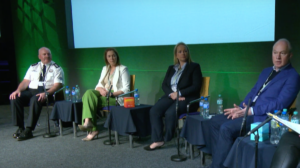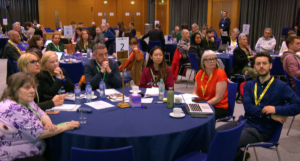Decriminalisation is likely to be a ‘key recommendation’ from Ireland’s Citizens’ Assembly on drugs, say experts, as members call for a public health approach to drug policy.
After the second meeting of Ireland’s Citizens’ Assembly on Drug Use, it is ‘inevitable’ that members will recommend the decriminalisation of the personal possession of all drugs, say those following the process closely.
The Citizens’ Assembly, led by chair Paul Reid, is made up of 99 members of the public selected at random to help make recommendations on the country’s drug policy.
Following a number of meetings the Assembly is required to submit a report and recommendation(s) to the Houses of the Oireachtas by the end of 2023.
The second session, which took place from 13-14 May, saw members visit the Coolmine and Merchants’ Quay drug treatment centres to witness services and hear the experience of those impacted by drug use.
Anger and frustration over ‘failings’ of drug policy
During Sunday’s wrap-up session, many expressed anger and frustration at the country’s ‘failed’ drug policy, calling for urgent funding for frontline services and a public health approach.
“We are suffering from a mixture of anger, fury and shame,” said one member.
“It seems appalling that in a rich society today, we have a portion of society which is stigmatised and ignored. Criminal records clearly, from what we’ve heard the last couple of days, achieve nothing. Prison achieves nothing. The central problem is there’s no funding, and there’s no funding because society isn’t interested.”
Another added: “It’s clear that the current policies have failed. If anything, they have probably made things worse.”
An overhaul of how the current system works, including a more holistic approach to treatment and prioritised funding to ensure access to services for all those who need them, were among the demands made by members.
There was also widespread acknowledgement of the link between trauma, mental health issues and substance misuse.
“Drug taking is both a consequence and a cause of mental health problems, and is the result and the cause of trauma,” commented a member.
While another made the point: “Criminalising the end user, who suffers from previous trauma, doesn’t work because it only leads to more trauma down the line.”

Members heard from frontline workers and those impacted by drug use. Photo: Citizens’ Assembly/Youtube
Responding to the experiences he had heard and witnessed from those using the treatment centres, one member stated: “We see how cruel it is to drag a person through the courts and put them in prison. Not only that… it is expensive to be putting somebody through court, and it is also very expensive… to have somebody in prison. Why isn’t that money being put into rehabilitation services?”
“They shouldn’t be treated like criminals. They’re not serial killers or terrorists. They’re suffering from an addiction and they should be helped.”
Closing the meeting on Sunday, Mr Reid, the former CEO of Ireland Health Service Executive (HSE) also called on policymakers to treat the issue with the ‘level of urgency’ it requires.
“It’s one issue when harm is caused by drug use and drug abuse but when harm is caused by some failings of policy, of legislation or of services, that’s just not right,” he said.
“This is an issue for policymakers, legislators, doctors, elected members to raise it to the level of urgency that it really needs. When we talk about stigmatisation or marginalisation, it’s a few communities that suffer worst… I call on the policymakers to think hard about that.”
Under-representation of ‘non-problematic’ drug use
Much of the discussion so far has focused on the harms of drug use, with many calling for the Assembly to address ‘non-problematic’ drug use and that which can be beneficial, for example the medicinal use of cannabis, which has not yet been discussed.
“I think many people are keen to see more discussion in future meetings about the harms of prohibition, rather than the harms of drugs,” said Brendan Minish, an activist and drug reform advocate.
Legal researcher and drug policy advocate, Natalie O’Regan, agrees.
“Non-problematic drug consumption is under-represented at the Citizens’ Assembly,” she said.
“As Jo-Hanna Ivers [Associate Professor in Addictions and member of the Assembly’s Advisory Support Group] said at the first meeting, ‘90% of drug consumption is non-problematic’, yet the 10% is getting 99% of the attention.We wouldn’t construct any other policy around 10%, I don’t see why drugs are so different.”
Decriminalisation likely to be ‘key recommendation’
Pressure for reform to Ireland’s drug policy was already mounting before the Assembly got underway, with leader of the People Before Profit party, Gino Kenny TD, submitting a bill to decriminalise the personal possession of cannabis at the end of 2022.
Drug reform advocates are confident that the Assembly will recommend the decriminalisation of personal use of all drugs in its final report.
While this is only a recommendation and it will then fall to policymakers to take this forward, Citizens’ Assemblies have previously held significant weight in enabling constitutional change on a number of key issues.
The format arose from the 2012-2014 Convention on the Constitution that considered a wide-range of constitutional matters identified for discussion. Arising from the Convention, the Government held the marriage equality referendum in May 2015 that introduced same-sex marriage. The model was then applied to a series of Citizens’ Assemblies across a wide-range of issues, including abortion, which led to the referendum to repeal the Eighth Amendment in 2018.

Citizens’ Assemblies have previously led to significant constitutional change in Ireland. Photo: Citizens’ Assembly/Youtube
“Prohibition is a fundamental cancer in our society, and it is quite clear that the 99 see this,” commented Peter Reynolds, chair of the Cannabis Industry Council, Ireland subgroup.
“I think we can see already that the decriminalisation of personal possession of all drugs is going to be a key recommendation.
“They are very angry about the lack of funding for drug treatment services and about politicians’ refusal to engage with stakeholders.
He added: “The big concern must be that although we can already see some positive recommendations coming out of this assembly, will they be implemented?”
But despite some initial concerns about how the process had been handled and the appointment of Mr Reid, Minish has been ‘encouraged’ by his leadership and the responses put forward by the members.
“Citizens’ Assemblies have often brought us politically to places that we just couldn’t have achieved otherwise in Ireland,” he said.
“There are a lot of limitations to how it’s gone so far, but I’m pleased that the 99 citizens really seem to be engaging with the subject and bringing a great deal of compassion and understanding to it.”
But decriminalisation alone won’t undo the harms associated with drug use, and the concerns of the members and Mr Reid over the lack of funding and need for expansion of treatment services have been echoed by commentators.
“Mr Reid forcibly made the very valid point that there’s plenty of action that the government can take now – and it should begin now – in addressing some of the harms,” said Minish.
O’Regan added: “We need serious investment, expansion and reform of treatment and other services desperately. Decriminalisation alone won’t solve the reason why people have a problematic relationship with a substance.”
The Citizens’s Assembly meetings are live streamed on Youtube. You can catch up here
- ‘Grave concerns’ over handling of Ireland’s Citizens’ Assembly on drugs
- Ireland Citizens’ Assembly to hear voices of those affected by drugs
- Ireland former health boss to chair Citizens’ Assembly on drugs
- Cannabis decriminalisation doesn’t increase road traffic accidents, finds study
- UK cannabis patients denied access to NHS mental health support
The post Decriminalisation likely to be ‘key recommendation’ of Ireland Citizens’ Assembly on drugs appeared first on Cannabis Health News.
Go to Source
Author: Sarah Sinclair

